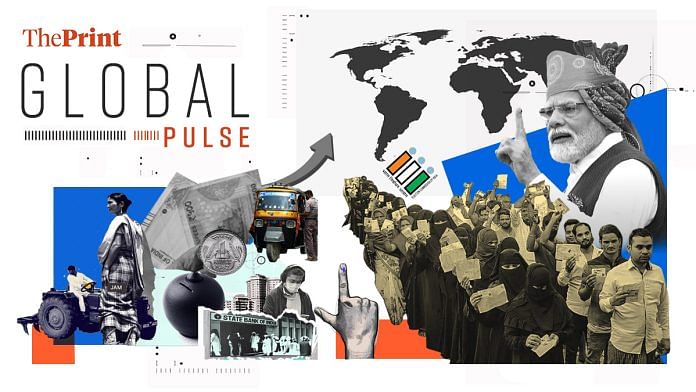New Delhi: India’s economy is growing at an annual rate of 6-7%, but whether this lasts depends on Narendra Modi’s ability to evolve and his party’s willingness to embrace inclusive politics if they win a third term, says The Economist column, ‘How strong is India’s economy?’.
While the rapid development of infrastructure in India and services exports are taking the country in the right direction, job creation remains a major challenge, says the column. With only a small fraction of the working-age population formally employed, “India’s economy must generate mass employment to sustain its growth”, notes the column.
The column identifies a “rising illiberalism” that’s keeping investors away, the Bharatiya Janata Party’s focus on “ideology and Muslim-bashing”, and state governments alienated by “Modi’s rebarbative politics” as some of the challenges in India’s path to becoming the third-largest economy in the world by 2027.
An Al Jazeera opinion piece—‘Modi wants to turn India’s election into a Hindu-Muslim war’—by Apoorvanand claims that Modi and his party leaders have been framing the national elections as a defence of Hindu interests against Muslims. Referring to a controversial speech by Modi at an election rally this month, Apoorvanand writes, “According to them, the Hindu majority face danger as the opposition Congress party is conspiring with the Muslim community to rob them of their wealth and entitlements and hand them over to Muslims.”
The piece notes that while Modi’s comments have sparked outrage, Modi and his party leaders are unapologetic and continue with their divisive narrative. Giving the example of the 2002 Gujarat violence when “Modi said he could not allow ‘children-producing factories’ to operate”, Apoorvanand says the PM “is considered an expert in dog-whistling” and “has mastered the art of insulting, mocking, and attacking Muslims without uttering the word Muslim”.
Claiming Modi’s speech was a clear violation of the Model Code of Conduct, Apoorvanand attributes the Election Commission’s silence to “compromised” independence, underscoring concerns over the erosion of democracy in India.
In Wall Street Journal’s opinion piece, ‘Indian Corruption: Forgotten but Not Gone?’, author Sadanand Dhume questions: “Is corruption no longer an issue in Indian politics?”
Dhume writes that ten years ago, Prime Minister Narendra Modi rose to power partially due to widespread disgust at the excesses of the Congress. He writes that while Modi’s supporters appreciate him for cleaning up the government, the “reality is more complicated”.
He highlights that while corruption doesn’t remain a hot topic in television debates, it remains a big problem for the public. Critics “say the Indian media is too scared to report on alleged malfeasance” and refer to the electoral bonds as “legalised corruption”, Dhume notes. However, he highlights that surveys by Delhi’s Centre for the Study of Developing Societies show graft has fallen from third to fourth concern among voters as an electoral issue.
Bloomberg’s latest report—‘Household Debt Hits Record High As Indians Splurge, Study Shows’—highlights a report by economists Nikhil Gupta and Tanisha Ladha of Motilal Oswal Financial Services Ltd, suggesting that household debt has touched a new high of 39.1% of gross domestic product in the October-December quarter, up from 36.7% a year ago.
The report highlights that non-housing debt, comprising 72% of total household debt, grew faster than housing debt, with an 18.3% year-on-year increase compared to 12.2% for housing loans, suggesting that Indians are likely borrowing for consumption rather than investment in physical assets.
The report highlights a surge in household debt poses risks to banks and the broader economy’s productive lending capacity.
A new government & a rape conviction overturned
In Haiti, a new provisional government was sworn in during a secret ceremony at the national palace in Port-au-Prince after Haiti Prime Minister Ariel Henry resigned formally—nearly two months after an insurrection plunged the city into chaos. To know more, click here.
Hollywood actress Ashley Judd says the overturning of disgraced movie mogul Harvey Weinstein’s 2020 rape conviction is a “hard day for survivors”. Four years ago, Weinstein was convicted of sexually assaulting a former production assistant in 2006 and raping a former aspiring actress in 2013 and jailed for 23 years. Read the full report by BBC.
(Edited by Madhurita Goswami)




“faces choice between economic growth and divisive politics” really !!!! you mean choice between economic with divisive politics and lackluster growth with unifying politics